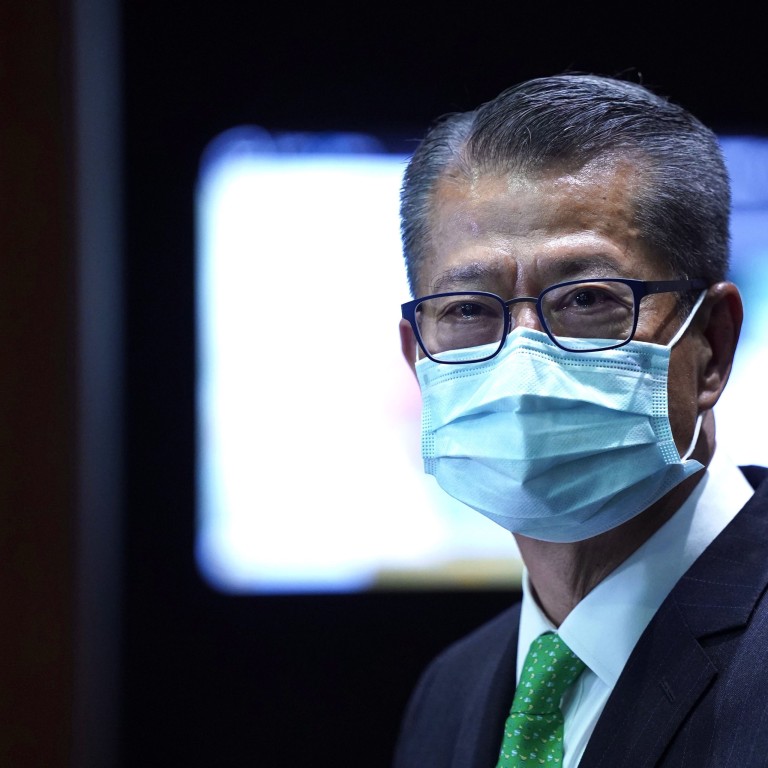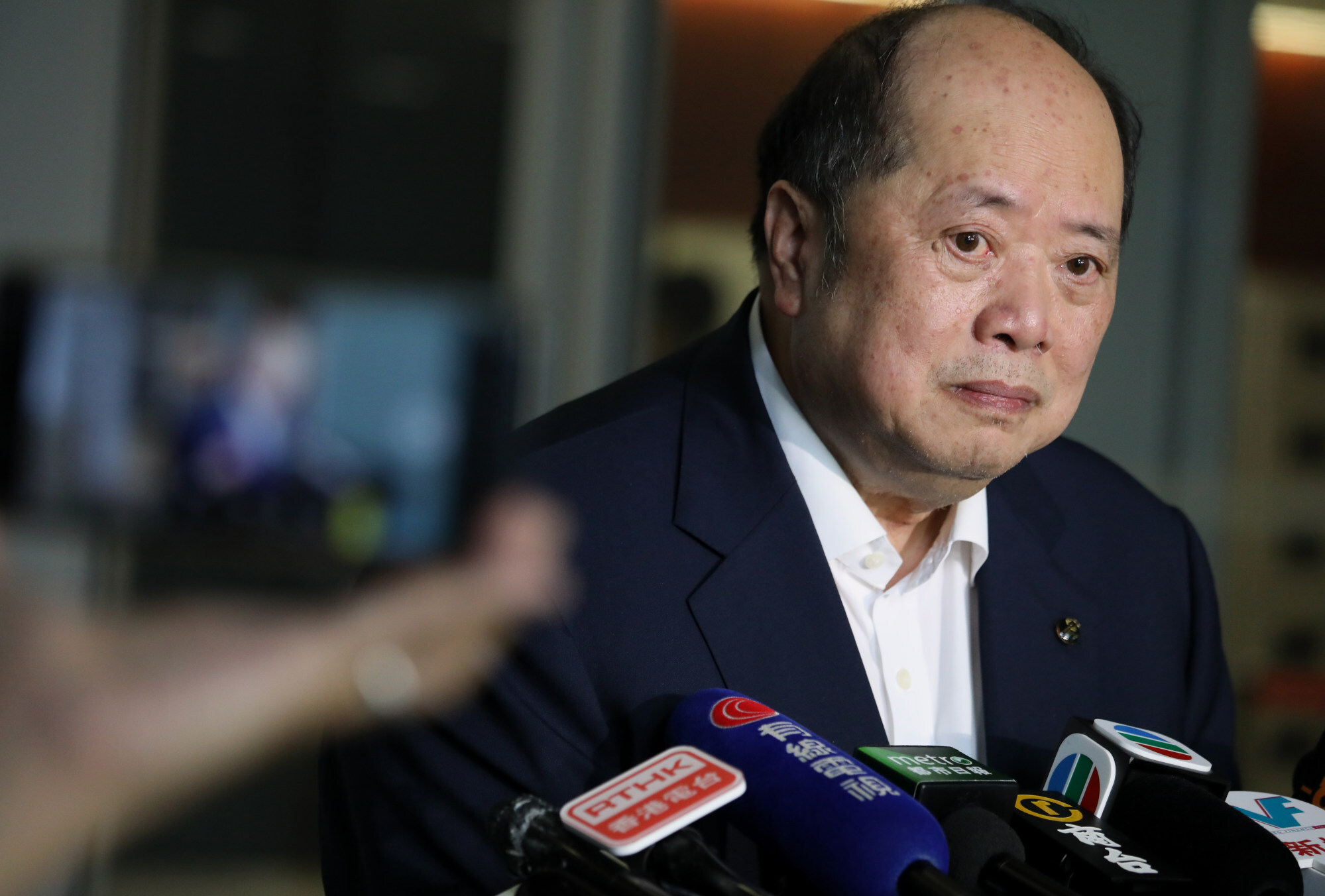
Hong Kong budget sails through Legco in record time as pro-establishment lawmakers approve HK$120 billion coronavirus aid package
- Electronic vouchers, low-interest loans among measures aimed at relieving financial burden on residents reeling from economic upheaval created by pandemic
- The debate, which saw 40 votes in favour, one against and one abstain, was taken in the absence of nearly the entire opposition camp, members of which stepped down en masse in November
Hong Kong’s legislature on Wednesday passed the administration’s budget in record time, including a HK$120 billion (US$15.4 billion) package that contains electronic vouchers, low-interest loans and a raft of measures aimed at relieving the financial burdens created by the coronavirus pandemic.
With the debate lasting just eight hours, the budget bill was passed with 40 pro-establishment lawmakers voting “yes” and localist Cheng Chung-tai voting “no”. Financial services sector lawmaker Christopher Cheung Wah-fung, who did not support a planned rise in the stamp duty for stock transactions, was the sole abstention.
The bulk of the city’s opposition camp resigned en masse in November after four of their colleagues were disqualified by Beijing, leaving Civic Passion’s Cheng as the only remaining opposition voice in the chamber.
Asked whether lawmakers had adequately discussed the budget, Financial Secretary Paul Chan Mo-po said “there had been communications and discussions with lawmakers during the whole process”, adding he would make sure the measures met the public’s needs.

His annual spending blueprint, unveiled on February 26, included e-vouchers designed to boost consumer spending and low-interest loans for the city’s growing number of jobless.
But the government also said it planned to increase the stamp duty levied on stock trading and raise the initial registration tax for private cars, while pledging zero growth in the civil service headcount for 2021-22 as part of cost-cutting measures.
Chan told lawmakers on Wednesday the government had tried its best to provide relief measures for residents amid a local economy slammed by the pandemic.
But while he expected the economy to improve this year, with strong GDP growth expected in the first quarter, he warned that low vaccination rates would hinder personnel exchanges and hobble the city’s economic recovery even as the Covid-19 situation improved elsewhere around the world.
“Controlling the epidemic is the key to economic recovery, and widespread vaccination is an important part of the anti-pandemic work,” he said.
“If the epidemic continues to subside, local consumption and the business atmosphere are expected to recover more fully in the second half of the year, and cross-border business travel is expected to return to normal. We hope more residents will get vaccinated.”
What did finance minister Paul Chan do right and why are pro-Beijing lawmakers still grumbling?
The financial chief added the employment situation would only improve if cross-boundary travel could resume, and graduates returning in the summer from universities overseas would also put pressure on the jobless rate.
“Because at the end of the day, Hong Kong is a very small open economy. Domestic consumption [alone] would not be able to sustain enough strong growth for us,” he explained. “We need to continue with external trade. We need quality tourism to come back, and this takes time.”
On the HK$5,000 e-voucher scheme, Chan said more details would be announced soon, and he hoped residents would be able to register by this summer.
Lawmaker Michael Tien Puk-sun said he decided to support the budget only after his discussions with the government suggested the administration was willing to minimise the number of instalments used to hand out the vouchers.
Tien had earlier said he would only vote for the budget if the e-vouchers arrived in two instalments rather than the five suggested earlier. Starry Lee Wai-king, chairwoman of the Democratic Alliance for the Betterment and Progress of Hong Kong, also called for more flexibility, so residents could spend the vouchers on items such as children’s tuition fees or entertainment.
The financial services sector’s Cheung, meanwhile, said he was very disappointed with the planned rise in stamp duty, something he believed would weaken the city’s status as an international finance hub.
Finance chief announces raft of tax relief measures, though many are smaller than in years past
“I feel greatly disappointed that the government lacks adequate understanding of market demand,” he said. “The increase in stamp duty will weaken the competitiveness of the local stock market and make the city less attractive for mainland companies to list in Hong Kong.”
But the finance minister argued the stamp duty increase – scheduled to take effect in August – would not affect the competitiveness of the stock market. He said the exchange’s average daily turnover had been about HK$190 billion per day since the stamp duty amendment was first revealed, more than the HK$130 billion daily average in 2020.
“If the market conditions remain prosperous, the stamp duty increase is expected to bring nearly HK$20 billion to the treasury every year,” he added.
The Financial Services and the Treasury Bureau also rejected Cheung’s suggestion of setting a “sunset clause” over the increase, citing financial pressures and the government’s need to increase revenue.
Debate over the budget, tabled as the appropriation bill, was delayed for weeks last year as opposition lawmakers resorted to filibustering tactics to force the government to address their demands.

